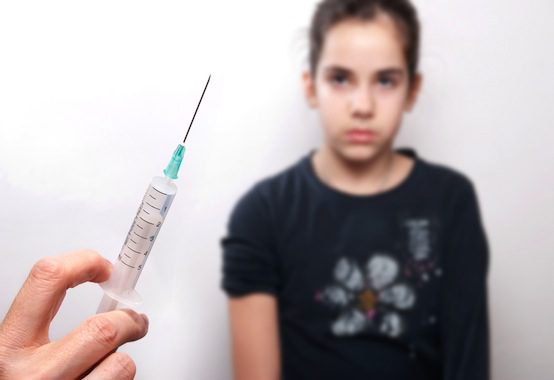Should the Government Mandate Vaccinations?

Vaccination has been a widely adopted practice in the U.S. since the very beginning. Thomas Jefferson himself was a great proponent–particularly of the smallpox vaccination, which he received shortly after its development in 1796.
Yet last week, in North Carolina’s Guilford and Forsyth counties, as many as 1,400 students faced suspension because their parents failed to vaccinate them. Those parents have opted out of the medical practice: their children have not received the required tetanus, diphtheria, and pertussis (whooping cough) vaccine, commonly known as TDaP. According to North Carolina state law, children must have up-to-date vaccinations or face suspension.
The decision to vaccinate doesn’t merely affect the child in question, but can also affect a family’s community by threatening the health of other children. It pushes a family decision into the public arena. Some people, such as Phil Plait, argue that the community impact is so great, the government is right to mandate vaccination. Plait, despite his personal libertarian leanings, explains:
In some areas, public school authorities have mandated that students be vaccinated for various diseases, and that of course can run afoul of parents’ beliefs. I’ve wrestled with this problem for a while, and I eventually came to the conclusion that a parent does not have the right to have their child in a public school if that child is unvaccinated … It puts other children at risk.
The societal aspect Plait references is “herd immunity.” Herd immunity is “when a critical portion of a community is immunized against a contagious disease, [so] most members of the community are protected against that disease because there is little opportunity for an outbreak.” David Perry frames the problem this way:
Happily, in a population of vaccinated people, infectious but preventable diseases have trouble spreading even to the immunocompromised. But herd immunity breaks down when vaccinations are not administered to all who can medically receive them. At that point, people who chose to refuse vaccinations endanger those who had no choice.
“Those who had no choice” refers to individuals born with immunodeficiency disorders. Such individuals are protected if their community is, for the most part, vaccinated. But the more their peers refuse vaccination, the more at-risk these individuals become. The possible societal fallout explains why so many support vaccine mandates. Yet while such mandates are well-intended, particularly considering children who can become ill and even die from preventable diseases, the question of liberty still remains. When should the government demand vaccination from dissenters? Can the government, as the Center for Disease Control puts it, employ “the police power of the state” to coerce parents against their will and perhaps consciences?
Vaccination could be a strong case for governmental health mandates: no one wants a child to die from a preventable disease. Nevertheless, if the government has a right to mandate vaccination because “it knows best,” it may slide into legitimating other less crucial mandates. Many people agree that children should receive vaccination, but such agreement should not authenticate governmental coercion. As it currently stands, these mandates require children in government-funded schools to vaccinate their children. However, parents need not enroll their children in such schools. This seems a just arrangement.
America has not yet reached a level of non-vaccination worthy of governmental intervention; hopefully citizens will recognize the medical and societal value of Plait’s argument before we reach that point. “If you want to rely on the public trust then you have an obligation to the public trust as well,” he said. “And part of that obligation is not sending your child to a place with other children if they aren’t immunized against preventable, communicable diseases.”
Ultimately, while there is a clear medical case for vaccination, some amount of wariness is justifiable. Liberty and freedom, however, require more than doing as we please: they require a consciousness of the community, a dispassionate and informed evaluation of the facts, and decision-making based on evidence of what is best for both the individual and society as a whole. Some parents—for religious, philosophical, or other reasons—may still choose to opt out of vaccination, and thus out of government programs like public school. That is their prerogative. But such parents must realize that by opting out, they are also putting other children at risk.